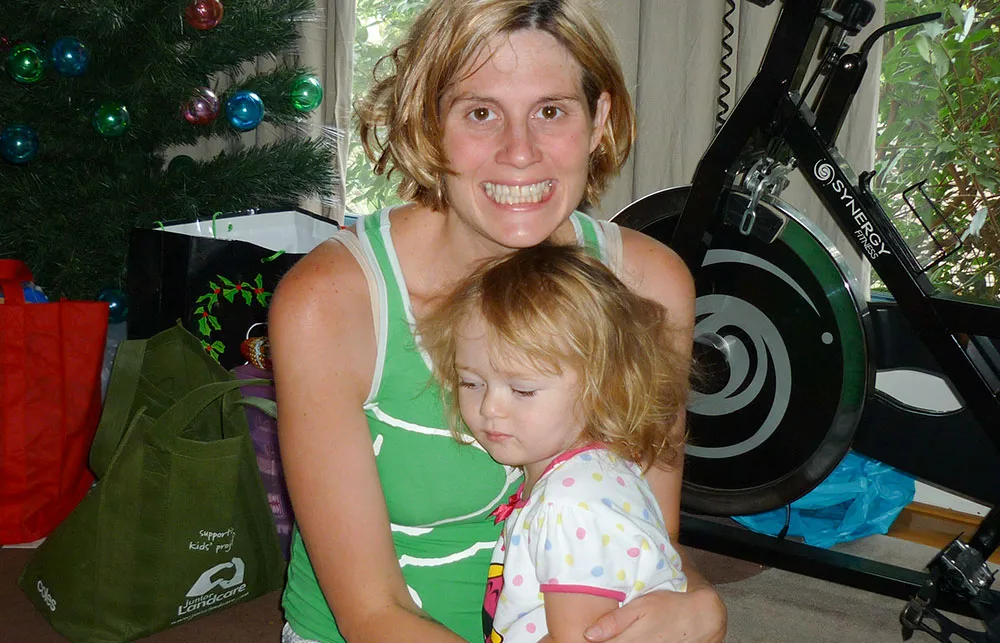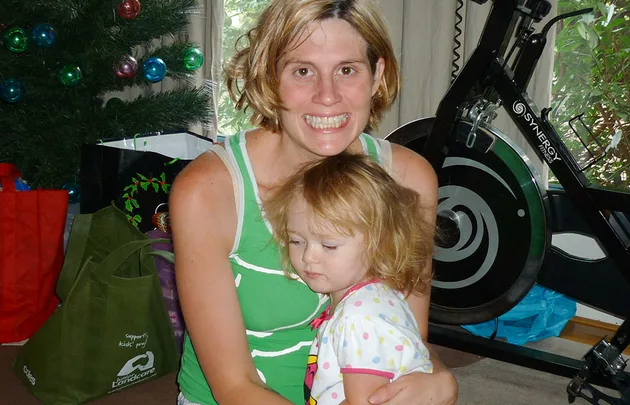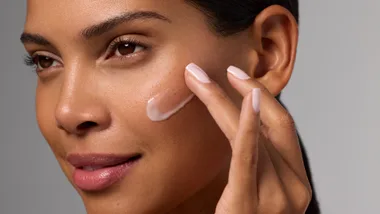Entombed in a prickly tangle of branches and leaves, Brodie Donegan could hear someone screaming, a anguished shriek that, at first, she didn’t realise, was coming from her. “Don’t move her. Don’t touch her,” other voices commanded, as searing pain invaded the young mother’s body. What’s happened to my right leg? she wondered, as she recovered consciousness. Is it still attached to my body?
The face of Brodie’s husband, Nick, came into view as he bent over her bloodied face. A hand pushed her shoulder. “I’m sorry. I’m really sorry,” said an unknown voice. Then more words cut through the chaos: “Go away. Don’t touch her. Leave her alone.”
Brodie hadn’t fainted, as she first thought. She was under the front of a car. Two older women, both nurses who lived up the road, sat next to her. One, or both, held her hand.
“What about my baby? Is my baby ok?” Brodie, then 29, asked the women. “They said, ‘Ashlee’s fine. She’s in the neighbour’s house.’ I said, ‘No, I’m pregnant. Is my baby ok?’ They said, ‘Hold my hand, just look at me.’”
Brodie’s baby, perhaps eight weeks shy of entering the world, was not ok.
On Christmas Day, 2009, hours after a mini-van driven by a prescription drug-affected woman slammed into her mum, Zoe Donegan was delivered by Caesarian section. She was stillborn.
Sitting in the café in Hornsby where she recounts the terrible story, the memory overwhelms her and she weeps.
The woman driving the car that killed Zoe was charged with grievous bodily harm, but only for the injury she inflicted on Brodie. Under current NSW law, destroying an unborn child intentionally or recklessly is recognised as a crime against the mother only. The same applies in Victoria, only the charge is ‘serious injury.’ “It’s hard to come to grips with, to be told that someone who caused the death of your baby is not being charged with the death of your baby,” she says.
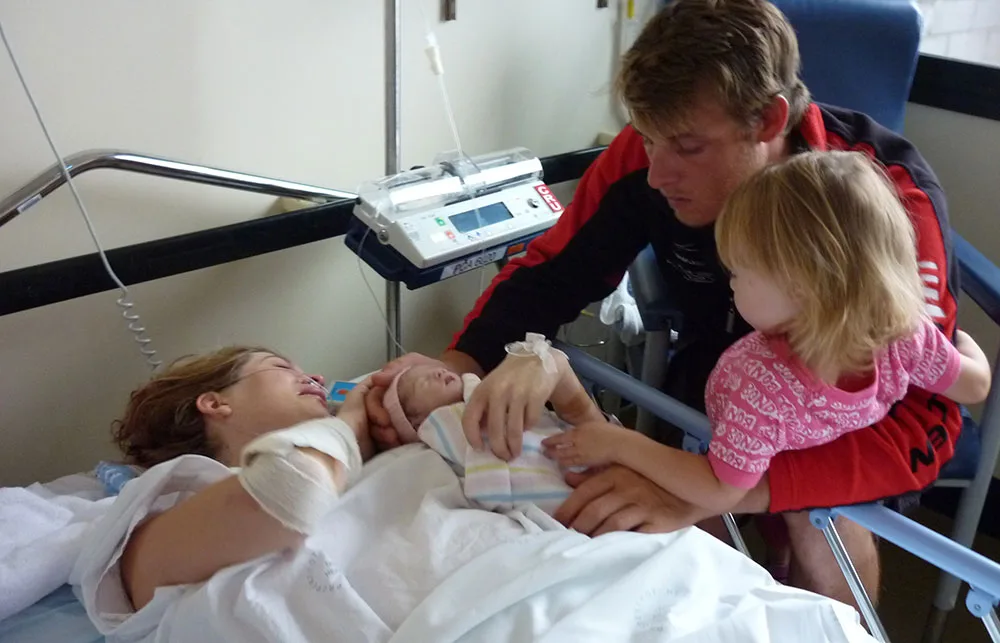
Now, after a vigorous campaign by Brodie, new legislation called The Crimes Amendment (Zoe’s Law) Bill, is being debated in the Upper House of the New South Wales Parliament. The bill seeks to have any foetus more than 20 weeks old, or weighing at least 400 grams, recognised as a living person under the NSW Crimes Act. Should the bill pass — a conscience vote in the lower house saw the bill carried 63 votes to 26 — an offender could be charged with causing grievous bodily harm to a foetus, separate to the mother.
Debate surrounding the bill, introduced in September by Brodie’s local MP, Central Coast Liberal Chris Spence, has been heated and, at times highly emotional. Opponents — including health and legal groups, feminist academics and MPs from across the political spectrum — say that despite specific exemptions for medical procedures, or anything “done by or with the consent of the pregnant woman”, changing the legal status of a foetus by giving it ‘legal personhood’ is bound to threaten women’s access to abortion.
After all, if a foetus has the legal rights of a person, then who, other than the foetus, has the right to decide to terminate that?
The last thing Brodie remembered on that Christmas morning, 2009, as she headed home after a short walk, was the sound of a car behind her, and stepping up onto the grass, away from the kerb.
What happened next on the quiet, residential road in Ourimbah, on the New South Wales Central Coast, was unimaginable.
Brodie, who was 32 weeks pregnant, had wanted to stretch her legs before setting off with Nick, and their two and a half year old daughter, Ashlee, for Christmas lunch at her uncle’s house in Newcastle, an hour’s drive away. Ashlee had wanted to go with her, but was persuaded to stay behind with her Dad. Her mum would only be gone ten minutes.
Brodie, who was only a few metres away from her driveway, doesn’t remember the impact; or hearing the mini-van hit a tree before it reached her; doesn’t remember going through the windscreen, nor being thrown back over the bonnet when the driver, who was later found to be affected by prescription drugs, ploughed into a second tree. It was only then that the mini-van came to a halt.
Her next memory, aside from those brief, confused recollections after she first opened her eyes, was of being airlifted to Sydney’s Royal North Shore Hospital by helicopter and begging medics “to take Zoe out” as soon as they found a heart beat. But it wasn’t that easy, as the devastated young mother soon learned. First she had to be stabilised, and her many injuries assessed. Over the next five days, she would have three operations: at one stage, a 10 centimetre screw was put through her hip into her spine.
Her only thoughts, though, were of the tiny life inside her that hadn’t stood a chance. “The impact of the car had caused the placenta to abrupt and Zoe had just slowly…died. She didn’t have any marks on her. I got to hold her and she was still warm. She looked absolutely perfect. Her eyes were open a little bit and she had a sore on her lip from the resuscitation – because they tried really hard to resuscitate her.”
Ashlee also got to see and hold Zoe on that devastating Christmas night. The little girl is now six, and has a brother, Lachlan, who recently turned three. Whenever Ashlee talks about sick babies, she says they have a sore on their lips, and she believed for a very long time that it was the sore that killed Zoe.
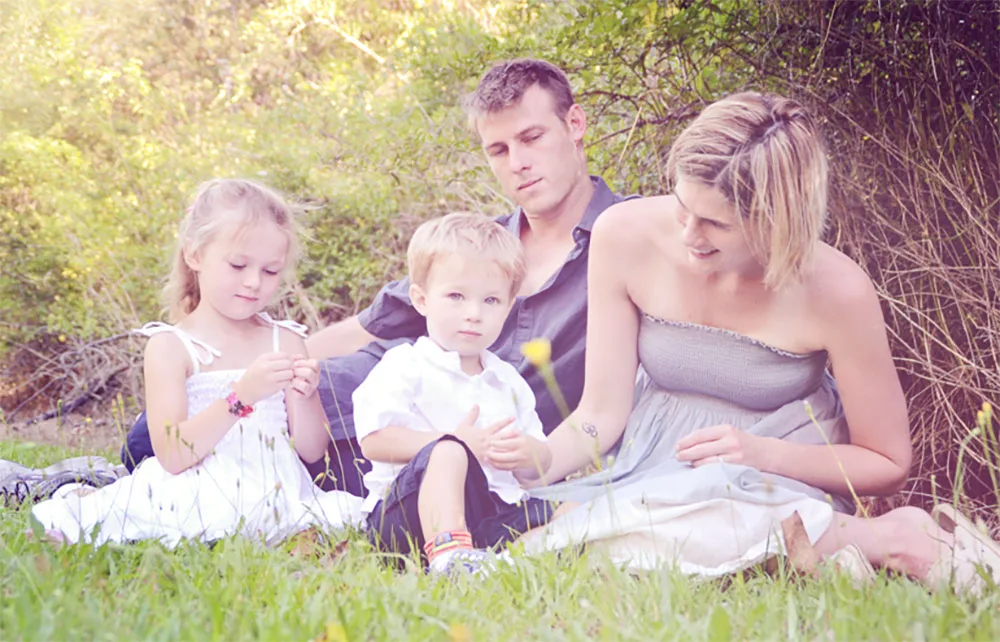
On December 27, 2009, two days after the tragedy in Ourimbah, Hannah Robert was driving along a Melbourne road with her partner and her partner’s two daughters, aged 14 and 15, after a picnic with family friends.
Suddenly, a 4WD coming from the opposite direction was sideswiped by a sedan whose driver, witnesses said later, had “aggressively” and “violently” changed lanes. Both cars were now on Hannah’s side of the road and she barely had time to shout, “What’s he doing?” when her car and the 4WD collided head on.
“The 4WD wound up next to us, or close to us. I could see some liquid pouring out of that car and I was terrified that it was petrol,” she says.
Unable to open her door, she told her partner and the girls to quickly get out of the car. But her partner couldn’t move, thanks to three fractured ribs and a broken hand and in any case, she was screaming and asking: “Can you feel Haloumi?” This was the nickname for their unborn daughter, Zainab.
Hannah was 33 years old, and 34 weeks pregnant. Zainab, conceived after nine months of fertility treatments and several years of searching for a sperm donor, had been hiccupping and kicking in her stomach at the picnic only a few hours before.
It took a long time to get Hannah out of the wreckage. The last of the four to be rescued, she’d held her partner’s hand while they were still in the car, telling her that everything would be alright.
“I knew placenta abruption was a risk, but I had it in my head that if this happened, I’d have a huge amount of bleeding. I thought, ‘I can’t feel any bleeding so the baby must be alright.’ The ambulance driver thought he could hear a heartbeat,” she adds. “But by the time we got to Emergency, they couldn’t find a heartbeat.”
She knew then that Zainab had died.
Hannah had a fractured sternum, liver and spleen lacerations, internal bleeding, a big chunk out of her kneecap, and two broken front teeth. Her partner and the girls had been taken to two other hospitals and she found the separation from them unbearable. Someone dug her phone out of her bag and she rang her partner to tell her their daughter was dead.
She saw Zainab for the first time when she woke up after the Caesarian. The midwife showed Hannah a photo.
“It was probably a good way to meet her, first by a photo, because it’s a very strange thing. You gear up for meeting the baby alive. I hadn’t even considered the prospect that the first time I’d see my baby she might have died,” she says.
Hannah’s partner discharged herself from hospital, and left wearing a medical gown over a pair of tracksuit pants that her brother, who drove her across town, had found in his car.
“She walked in and I said, ‘Come and meet your daughter.’ So she was there when we washed Zainab. It was bizarre because we didn’t put a nappy on her.”
Hannah’s voice falters. “She didn’t need a nappy. But… babies look different when they don’t have a nappy…”
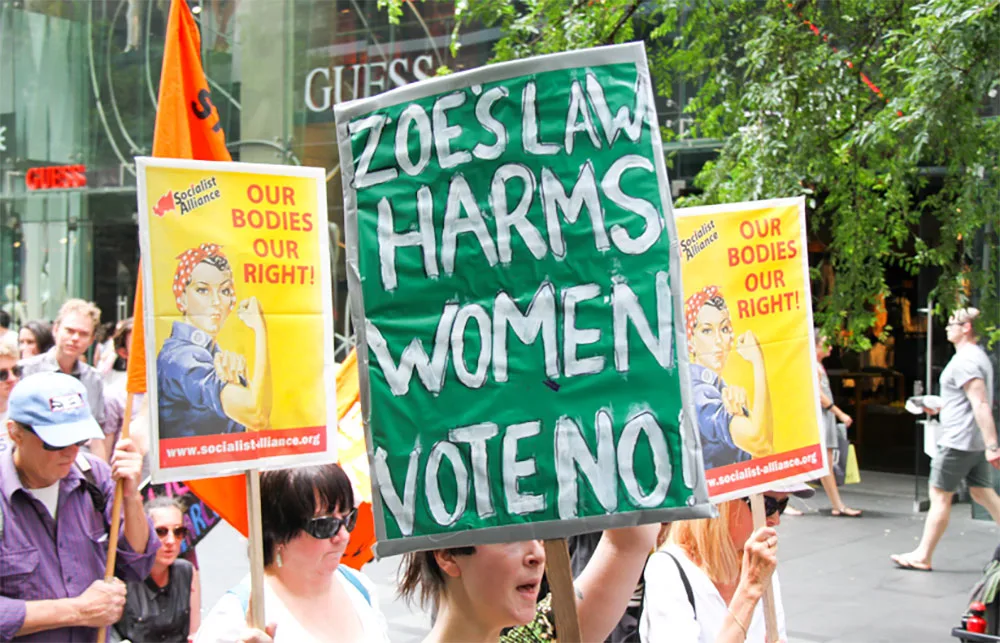
In November, a powerful essay on the proposed changes to the NSW Crimes Act appeared on The Conversation website, called ‘Why losing my daughter means I don’t support Zoe’s law.’
It’s author: La Trobe University law lecturer — and Zainab’s mother — Hannah Robert.
Hannah emailed Brodie a month before the essay appeared, to let her know what she was going to say before going public. The message followed a much earlier exchange of emails in 2010.
Hannah has huge sympathy for the woman whose campaign for a change in the law has resulted in the current controversy. She agrees with Brodie that the law as it stands is inadequate — and that calling the loss of their daughters an “injury” fails to acknowledge the depth of sorrow involved in the loss of Zoe and Zainab.
But she questions the idea of separate legal rights for the foetus.
“I have no doubt that my daughter was a person – but I am comfortable with the idea that, at the time she died, she was protected by my legal personhood rather than her own,” she wrote in her essay.
In her office at La Trobe, Hannah continues: “If you define the foetus as a legal person, it opens the way for equality claims or challenges to the legislation to say, “How is it that you can have a foetus defined as a legal person in this circumstance, but not in this circumstance?’
Hannah believes the bill may be “opening the way for what we’re now seeing overseas.”
She mentions a case in Florida, in 1991, when a woman who told doctors she’d taken cocaine before giving birth, was convicted of supplying drugs to a minor. Under Florida law, a foetus only becomes a legal person after birth. So the prosecutors argued that the supplying of drugs occurred during the 30 to 90 seconds between the emergence of her baby from the birth canal and the severing of the umbilical cord.
The woman’s convictions were overturned on a second appeal, but says Hannah, the case clearly shows that you don’t need foetal rights to fit in with a pattern that’s gathering pace in the US of criminalising pregnant women’s behavior.
“There’s nothing punitive towards the mother in the current drafting of Zoe’s Law,” she adds. “But you’re setting up those exceptions for any actions of the mothers to be challenged.”
Supporters of the bill say fears of its impact on abortion law are simply an overreaction by a feminist coalition.
But male medical heavyweights have also waded into the debate. Brian Owler, the Australian Medical Association’s New South Wales President, told ABC radio that while Zoe’s Law was well intentioned, it could have unintended consequences for obstetricians or geneticists. The law could jeopardise access to mothers, he said, particularly when late-term abortions take place for very good medical reasons. Some extreme abnormalities, he pointed out, don’t show up until late in a pregnancy.
New South Wales and Queensland remain the two states where abortion is still a criminal offence, although Tasmania removed abortion from the state’s criminal code only in November.
The very precariousness of Abortion Law is why declaring a foetus to be a living person is so dangerous, says Sydney lawyer Julie Hamblin, an expert in health law and sexual and reproductive rights. “People say to me, ‘Well, if Zoe’s Law does go through in the upper house, what are going to be the implications tomorrow?’ The reality is, tomorrow – probably nothing. It’s going to be when the next case comes to court challenging the lawfulness of abortion.”
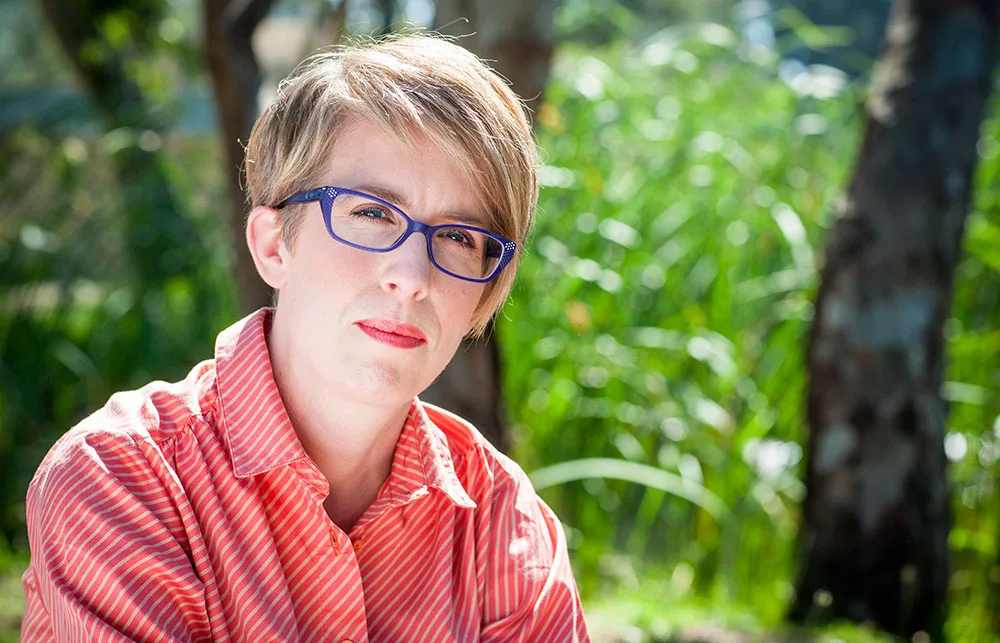
If Zoe’s Law itself wasn’t worrying enough for its pro-choice critics, one name attached to the debate was almost guaranteed to ring alarm bells: The Rev Fred Nile. A member of the Legislative Council for the Christian Democratic Party, and well known for his anti-abortion views, Nile took it upon himself to introduce his own version of Zoe’s Law earlier in 2013. According to him, his bill sought only a just legal response to ‘the destruction of a child in utero, other than in the course of a medical procedure or with the consent of the mother.’ But it came as part of a package of private member bills that he presented at the start of 2013 that would have made access to abortion in New South Wales much harder.
Zoe’s Law – his fifth bill – wanted to give legal rights to a foetus from conception.
Brodie Donegan has made it very clear that she’s pro-choice and against anything that would make it harder for women to seek abortions. She stresses she has no connection to — or contact with — with Fred Nile.
“I am completely for whatever path a pregnancy takes, that person is supported,” she says. “If they need or want to have an abortion, they have that. If they need a medical intervention, they have that.”
Lawyer Julie Hamblin says she takes little comfort from the exemptions in Zoe’s Law that say it doesn’t apply to medical procedures. “There’s no way that Zoe’s Law is going to conclusively determine that abortions will be found unlawful in the future. It’s just another weapon for the pro-life people to be able to use if they want to bring a test case to challenge the lawfulness of abortion.”
Certainly, Right To Life Australia President, Margaret Tighe, indicates that this may happen.
“The child in the mother’s womb is considered to be a nobody,” she says. “The pro-abortion lobby are scared that this is going to be the foot in the door for recognition of the rights of the unborn. Even the mother who lost Zoe in this terrible accident says she’s in favour of abortion.
“Of course I’m for Zoe’s law because it acknowledges that an unborn child is another human being.”
Many argue that there’s no need for Zoe’s Law since the 2005 Crimes Amendment (Grievous Bodily Harm) Act already extended the definition of grievous bodily harm to include the destruction of an unborn child (other than in a medical procedure), whether or not the mother suffers any other harm, with a maximum penalty of 25 years prison.
The woman driving the car that killed Zoe Donegan spent nine months in prison, followed by an 18-month parole period. Brodie wept in court, feeling the sentence was her fault. “But to have a jail sentence made me feel like it was at least taken a little bit more seriously,” she says.
So do we really need a law that recognises separate legal rights for a foetus, given that the driver was incarcerated?
Brodie’s reply is sad, and moving. She says she would like to have heard the driver charged with Zoe’s death. “If the judge could have read out the charge and acknowledged that Zoe had existed and died, that would have made a difference for me, and for Nick. All I wanted was to have an acknowledgement that we had lost Zoe, and that this wasn’t just a crime against me.”
As she speaks, her hand goes to a tiny indentation in the silver pendant hanging around her neck. Zoe’s fingerprint.
